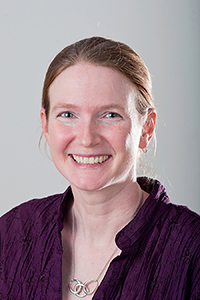UNIVERSITY OF WISCONSIN River Falls
Honors and Awards
2023 - Jill Coleman Wasik
In recognition of her high-level, water-related research for the past decade at UW-River Falls, Environmental Science Associate Professor Jill Coleman Wasik is the recipient of the 2023 University Excellence Award in Research, Scholarly and Creative Activities.
The award recognizes quality research with students and dissemination of that research through presentations and publications. It also is a recognition of creative approaches and the ability to obtain grant funding to conduct research projects. The award, announced during the fall Opening Meeting, was presented for the first time in 2023 and its honoree is chosen by university administrators.
 Coleman Wasik’s projects have covered a wide array of water topics, from a first-of-its-kind effort to identify microplastics in the environment, to investigating regional surface and groundwater quality, to projects that address the social and human dimensions of water quality and land management.
Coleman Wasik’s projects have covered a wide array of water topics, from a first-of-its-kind effort to identify microplastics in the environment, to investigating regional surface and groundwater quality, to projects that address the social and human dimensions of water quality and land management.
Much of her work has involved UWRF students for whom Coleman Wasik has created high-quality research opportunities that lead to important contributions to water quality in northwest Wisconsin.
“Throughout her 10 years at UWRF, Jill’s research contributions and productivity have been exemplary,” Holly Dolliver, UWRF geology and soil science professor and chair of the Plant and Earth Science Department, wrote in a letter nominating Coleman Wasik. “The breadth and depth of [her] projects is extremely impressive.”
Foremost among Coleman Wasik’s work is teaching students. Coleman Wasik has served as mentor for 21 undergraduate research projects in addition to service as a member of the Undergraduate, Scholarly, and Creative Activities (URSCA) Council. She often incorporates undergraduate research into coursework and works to ensure opportunities for students to present and publish their research at conferences across the state and country.
Coleman Wasik said she focuses on meeting students where they are in terms of their research skills and building on them. She seeks to challenge students, whether they are new to research or have previously accomplished high-level work.
“For some, that means repeating a well-known study on a small scale on campus,” Coleman Wasik said. “For others it is designing a rigorous, regional project that results in publication.”
Through her research, Coleman Wasik has linked UWRF to partners and collaborators with the aim of improving water quality. She is well known in western Wisconsin for her work to monitor and preserve waterways. She works effectively with the regional farmer-led organization Western Wisconsin Conservation Council (WWCC) to help understand the impacts of agriculture on local waters. She has built relationships with conservation professionals, farmers, and landowners to gain a scientific understanding of issues and opportunities.
“Jill often serves as a bridge connecting groups and individuals together in synergistic ways,” Dolliver said.
Coleman Wasik’s research, and that of her students, directly benefits the Kinnickinnic Watershed, the St. Croix River Valley and other areas. She has obtained more than $903,000 in funding from numerous sources, including the United States Department of Agriculture, Dairy Innovation Hub, Freshwater Collaborative of Wisconsin, and WWCC to support her research efforts.
She has authored numerous scientific articles and has presented her work at several conferences. Coleman Wasik also has been a moderator and panelist at various scientific events. She is a member of the Freshwater Collaborative of Wisconsin (FCW) Steering Committee and leads the FCW effort at UWRF.
In addition, Coleman Wasik guides other campus faculty through the process of securing grant funding to support freshwater research opportunities, helping UWRF make available high-quality freshwater science programs.
“Jill has worked hard to encourage participation from a range of disciplines on our campus and is very supportive in guiding faculty through the process and advocating for their projects,” Dolliver said. “Her work benefits this university and its students in so many ways.”











